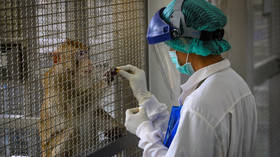The West’s moral cowardice over animal rights has helped China to become a world leader in biotech research

The global shortage of monkeys resulting from the unexpected demand caused by the Covid-19 pandemic has exposed the inconvenient truth that the world is now more dependent on China than ever before.
It might be strange to state that one of the most pressing requirements facing the world today is the need for more monkeys whose DNA closely resembles humans.
As new variants of the coronavirus threaten to make current vaccines obsolete, scientists worldwide are racing to find new sources of monkeys, who remain critical to the development of vaccines for humans.
A recent ban on the sale of wildlife from China, the leading supplier of these lab animals, has revealed a critical shortage of the primates. It has also exposed how the West is now more dependent on China, a regime with colossal biotech ambitions of its own.
There is an irony and deadly hypocrisy at the heart of this dilemma.
The irony is that despite the West’s desire to end its reliance on China, it has actually strengthened its rival, not only in the immediate future, but mainly the long term.
Also on rt.com Comparing people to animals is offensive to animals – the latest load of bull to come down from PETA’s high horseThe hypocrisy is that the West has attempted to claim the high moral ground by conceding, under pressure from outspoken animal rights protesters, that animal-based research is unethical. In reality, they have outsourced much of the ‘dirty work’ to China and Japan.
The result? China has become the largest supplier of primates for research globally. Before the pandemic, for example, it provided over 60% of the 33,818 primates, mostly cynomolgus macaques, imported into the United States in 2019. And China is now fast becoming the global centre for primate-based research into neuroscience – an area that is critical to the future of both neurological disorders and artificial intelligence.
Animal rights activity in Europe and the US has seen a continuing decline of research in the Western world, and a significant shift toward China. Researchers from major academic institutions in the US and Europe are sending their primate work to China. It’s cheaper, there is less regulation, and the Chinese can do it. And, of course, its deflects domestic opposition.
This is giving China a significant lead in research into neurological disorders. It should be remembered that these disorders are the world’s second-leading cause of death after heart disease. And as the world’s population ages and conditions such as Parkinson’s disease, Alzheimer’s and dementia become more burdensome, success in these fields is a huge strategic and competitive goal for the future.
Does anyone seriously believe that if China were to develop drugs to combat these diseases, Western governments would instead uphold animal rights rather than buy them from a country that has allowed ‘unethical’ research to make such breakthroughs? I’d like to see any politician publicly justify placing animal welfare above that of their ageing constituents.
Also on rt.com Bad tackle: Chelsea ace Pulisic in hot water with animal rights groups after ‘abusing’ fish in social media stunt (VIDEO)It is essential to call out this hypocrisy, because it reveals how cowardly the West has become in upholding its society’s moral and ethical foundations. Animal research has been one of the most significant sources of scientific breakthroughs that have benefited all of humankind, not just the wealthy.
The truth of the matter is that Western governments still do uphold this principle. But they are doing it through the backdoor. They refuse to defend it publicly. Instead, their cowardice has strengthened the hand of the anti-human animal rights zealots. The moral argument has been lost.
Not surprisingly, research on primates – mostly macaque monkeys – has become increasingly unpopular in Europe and America. The EU wants to end all animal research at an unspecified point in the future. American lawmakers are trying to pass the Humane and Existing Alternatives in Research and Testing Sciences Act, encouraging a move away from reliance on animals. In both Europe and America, the number of monkeys in research has been flat or falling for the last five years.
Of course, animal welfare is important, and cruelty should rightly be condemned and outlawed. And perhaps, in time, breakthroughs in technology will make animal testing unnecessary. But for now, and especially in the face of Covid-19, the principle of placing human life above that of animal life is morally and practically the only option.
Think your friends would be interested? Share this story!
The statements, views and opinions expressed in this column are solely those of the author and do not necessarily represent those of RT.













